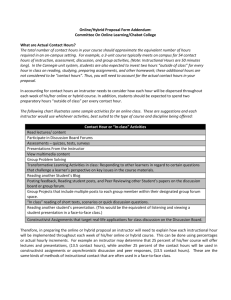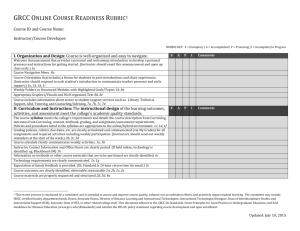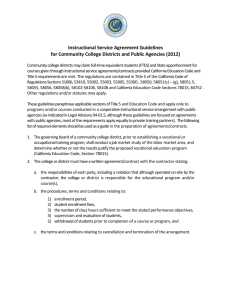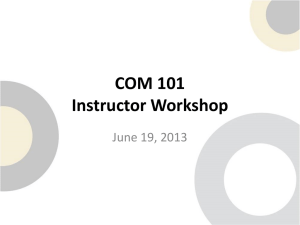eTROY Faculty Expectations for Teaching Online
advertisement
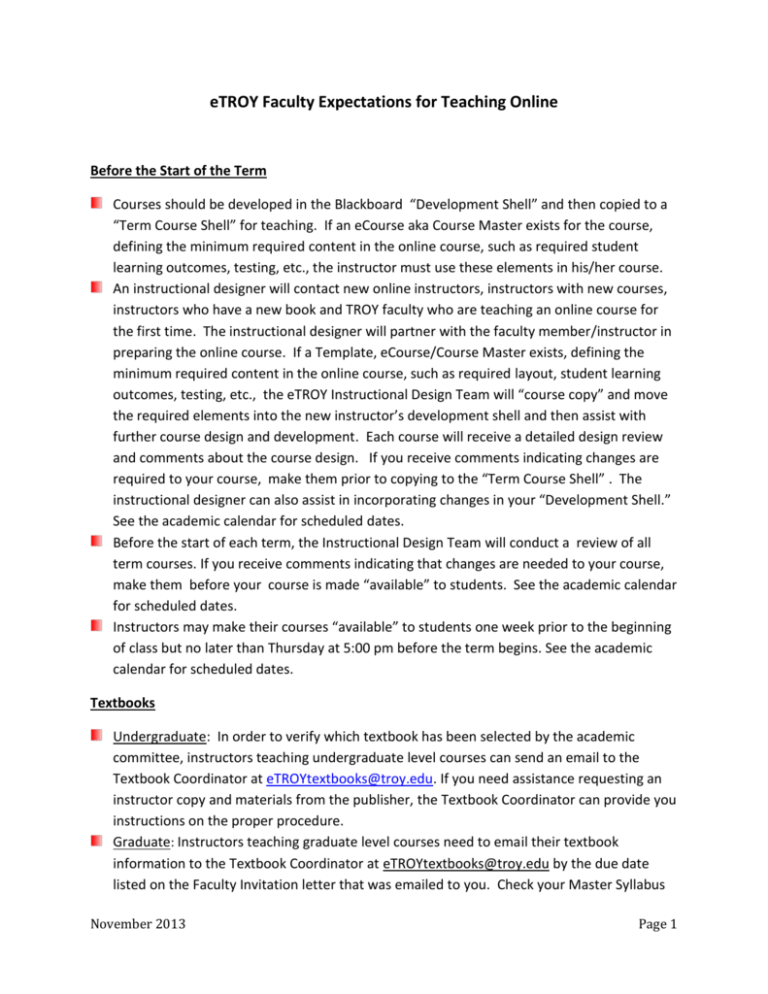
eTROY Faculty Expectations for Teaching Online Before the Start of the Term Courses should be developed in the Blackboard “Development Shell” and then copied to a “Term Course Shell” for teaching. If an eCourse aka Course Master exists for the course, defining the minimum required content in the online course, such as required student learning outcomes, testing, etc., the instructor must use these elements in his/her course. An instructional designer will contact new online instructors, instructors with new courses, instructors who have a new book and TROY faculty who are teaching an online course for the first time. The instructional designer will partner with the faculty member/instructor in preparing the online course. If a Template, eCourse/Course Master exists, defining the minimum required content in the online course, such as required layout, student learning outcomes, testing, etc., the eTROY Instructional Design Team will “course copy” and move the required elements into the new instructor’s development shell and then assist with further course design and development. Each course will receive a detailed design review and comments about the course design. If you receive comments indicating changes are required to your course, make them prior to copying to the “Term Course Shell” . The instructional designer can also assist in incorporating changes in your “Development Shell.” See the academic calendar for scheduled dates. Before the start of each term, the Instructional Design Team will conduct a review of all term courses. If you receive comments indicating that changes are needed to your course, make them before your course is made “available” to students. See the academic calendar for scheduled dates. Instructors may make their courses “available” to students one week prior to the beginning of class but no later than Thursday at 5:00 pm before the term begins. See the academic calendar for scheduled dates. Textbooks Undergraduate: In order to verify which textbook has been selected by the academic committee, instructors teaching undergraduate level courses can send an email to the Textbook Coordinator at eTROYtextbooks@troy.edu. If you need assistance requesting an instructor copy and materials from the publisher, the Textbook Coordinator can provide you instructions on the proper procedure. Graduate: Instructors teaching graduate level courses need to email their textbook information to the Textbook Coordinator at eTROYtextbooks@troy.edu by the due date listed on the Faculty Invitation letter that was emailed to you. Check your Master Syllabus November 2013 Page 1 or with your Department Chairperson for an approved textbook list, where applicable. Please submit the following information to the Textbook Coordinator: Title, Author(s), Edition, Publisher and the ISBN. Proctoring Proctored course exams are handled electronically and are not stored within eTROY after the term is completed. Instructors are required to change passwords and resend exam each term. Instructors will submit their “proctored” exams for undergraduate courses through the following link: https://etroy.troy.edu/forms/eProctorForm.aspx. Instructors must notify their students at the start of the term that a proctored exam is required using the suggested announcement provided in the Proctored Exam Guidelines: https://troy.blackboard.com/bbcswebdav/institution/Instructional%20Design/Web/Pro ctored%20Exam%20Guidelines.pdf eTROY reviews all proctors submitted by students, and sends exam data to each approved proctor. For further clarification of undergraduate proctored exam procedures, contact the Assistant Director of Undergraduate Testing. The exam information must be submitted no later than the first week of the term. Each College has the option of offering one proctored exam per term for each graduate course. Please check with your respective department chair. NOTE: Instructors will be available during their scheduled exam time should questions arise. General Expectations for Online Instructors Use the Troy University email account provided to faculty, students and staff. All Blackboard generated notifications will be sent via a Troy University email account. Complete eTROY Teaching Online Proficiency (TOP) course and become Certified to use Blackboard and teach online at TROY. Personally and professionally develop as an online faculty member/instructor by attending training and faculty development sessions offered by eTROY Instructional Design. Attend at least one session offered by eTROY Instructional Design per year. Join professional organizations’ dedicated to teaching online (e.g. Sloan-C, MERLOT, United States Distance Learning Association, EDUCAUSE Learning Initiative). Create and deliver courses in a professional and organized manner, and interact with students in a constructive and encouraging manner. Each course should apply the principles of Universal Design for Learning and use varied Bb feature functionality. November 2013 Page 2 Instructors should not conduct their course(s) as “self-paced.” TROY does not offer “selfpaced” online courses. Create a course which uses principles of Universal Design for Learning. Create a course which Create a learning environment that reflects the TROY culture and meets the needs of a diverse body of student learners (“education to succeed, to land a terrific job,” “high touch –high tech,” “academic excellence,” “high quality,” “convenient,” “help students build a life with purpose,” “educate the mind to think, the heart to feel, the body to act”). Do not rely solely on the publisher resources or third party content, assignments and assessments. Foster participation with group and collaborative activities. Encourage participation by all students. Create assignments that are experiential, applied, and meaningful. Use alternative assessment approaches such as case based, problem based, project based, application, peer-mentor, clinicals, simulations, labs, and/or internships. Use varied technologies and multiple formats in course delivery. Incorporate the principles of Universal Design for Learning. Contribute toward the continuous improvement of your course(s) through feedback received from student evaluations, quality assurance course reviews and program reviews. Course Design and Development Expectations - The following must be completed prior to the course term review and for new courses prior to the detailed design review. See Academic Term Schedule on the “Faculty Resources” page in Bb. Use the Detailed Design Review and Course Term Review criteria to design and develop your course. Make sure your course is free of grammatical and spelling errors and that all dates and information is updated when re-using material from an earlier class. Assure learning objectives are stated, measurable and mirror the objectives which are published at other locations objectives (e.g. master syllabus and mini syllabus). Establish Instructor Persona by connecting online with the students as many ways as possible using tools and features in Blackboard including announcements, video everywhere, photos, voice authoring, voice threads, and/or the instructor contact button. Include a detailed faculty biography and office hours. Develop a comprehensive course syllabus using the eTROY Standardized Course and Master Course Syllabus format and designed around textbooks selected and approved by the department. As much latitude as possible, within the parameters set by the appropriate discipline, is given to instructors in developing the content of their syllabus. The Troy University syllabi information is in the Faculty Handbook and the Quality Assurance area of the Bb faculty lounge. November 2013 Page 3 Clearly articulate the academic requirements for the course, including learning outcomes, course objectives, course assignments, participation requirements, examinations, and evaluation rubrics in each module, course syllabus and course schedule. Develop course content which includes components of theory, practice, and application. Make the content meaningful/applied. o Combine documents and materials and place them into neatly organized modules/folders. The more organized the modules/folders, the more students will benefit. The discussion board should not be the only place where the course content is available. o Use a variety of information sources to explore. Include different types of material such as presentations, videos, audio, readings, articles, photographs. Digital material is available through publishers, in Bb-NBC Learn, in MERLOT and the internet. Bb features such as Collaborate can be used to create your own digital content. Do not rely solely on the publisher resources or third party content. o Check any instructional materials requiring the installation of software, plug-ins, codes or other controls to determine ease of use. Instructions must be provided to the student. Class Discussions and Community o Set clear expectations for discussion participation (quality, quantity, netiquette, participation, interaction with other students). o Create collaboration and community by using a variety of tools and approaches: groups, discussion board, collaborate, mobile, Bb IM wikis, blogs, and journals. Assignments o Use the Blackboard assignment and assignment submission features. Keep the assignments and routes of submitting them in Bb. Do not use TROJAN Email or any other outside email account (Hotmail, Google, Yahoo, etc.) for assignment submission. If other routes of assignment submission are required, build them into the Bb course design. o Students should apply the content thru many forms of assignments. Build student assignments that are meaningful such as problem based, service learning, synthesis, field based, applied, experiential. Deliverables can include written documents, audio visual productions, photographs, messaging, screenshots, and mashups (using content/products from multiple sources to create a single product). Do not rely solely on the publisher resources or third party assignments. o The discussion board should not be the only place where the course assignments are available and conducted. o Assignment expectations, grading criteria (i.e., rubrics and/or checklists) and submission requirements are clearly stated for each assignment. November 2013 Page 4 Assessments o Use the Blackboard assessment features and/or incorporate external assessments into the course design. If other routes of assessment are required, build them into the Bb course design. Do not rely solely on the publisher resources or third party assessments. o Exams/Quizzes/Assessments must align with the learning objectives and measure learning. o Create Assessments of learning using varied approaches such as peer review, groups, projects essays, papers, application. Consider using Respondus, Publisher Material or Turnitin. Do not rely solely on the publisher resources or third party content, assessments. Grade Center o Instructors should build a grade center with all assignments, activities, participation, assessments and then include the associated points which will be awarded. If weights are stated in the syllabus, then the Grade Center should reflect the weighted grade including the total column. If an instructor or program selects to use publisher-based assignments or tests, the grades and grade column must transfer back to the Blackboard Grade Center. It is the instructor’s responsibility to create the grade column and post grades in the Grade Center. Instructional Technology o Uses varied instructional technologies (mobile, Bb Course Tools, blogs, wikis, web2.0 tools) and multiple formats (audio, video, websites) in the course delivery. o The course is functional on mobile devices, as designed and planned. o Technology requirements are present in the course. Accessibility o The instructor recognizes the importance of curse development in relationship to accessibility issues. Accommodating students of all abilities is vital. Supplemental Material and Helpful Resources o Links to relevant materials and resources outside the classroom are provided. o Use supplemental material for remediation, if required. Course Delivery Expectations - The following are requirements after the term begins and students are in the course. eTROY expects that all Blackboard courses will be made available and ready for students one week prior to the first day of the new term and no later than Thursday at 5:00pm before the term begins. Complete and submit an attendance roster (via Trojan Web Express) by the end of week two. November 2013 Page 5 Best Practices indicate that instructors should log in to their Blackboard course(s) on a daily basis in order to respond to student inquiries, monitor student progress, engage in student activities, and grade student submissions. eTROY requires that instructors login every 48 hours. If an instructor goes 72 (3 days) without accessing their course(s) in Blackboard, an email notification will be sent to the instructor’s troy.edu email account. If the instructor is out of the course for 96 hours (4 days), the instructor will receive a second email notification. Key administrators, including the Department Chairs and Deans, will also be notified of the instructor’s absence from their course(s). Remember: Students expect faculty to be accessible and provide timely feedback. Responsiveness of this nature also contributes to the overall dense of instructor presence. Instructors should respond to student questions within 24-48 hours. This includes any emails, discussion board questions, and voice mail. Instructors must inform the learner of when they can expect a response if the instructor cannot provide a detailed response within 24-48 hours. Any student complaint concerning a lack of response from the instructor will be verified and reported to the respective College Department Chair. Depending on the number of verified complaints and circumstances, it may be determined that the instructor cannot continue to teach through eTROY. This decision will be made jointly by the Colleges, respective Departments within the Colleges and eTROY. Class Discussions and Community o Develop a sense of community among students in the course. Keep students engaged in productive dialogue. Establish a learning environment where students are comfortable disagreeing with other students while still maintaining a sense of trust. o Communicate with students both with and outside of content class discussions by sharing information related to the students’ professional interest and goals, and in an effort to establish and maintain a sense of community among students. o Hold class discussions and participate. Identify areas of agreement and disagreement on course topics. Exchange ideas in the student discussion, and continually challenge students to deepen their thinking. Facilitate discourse. o Check the discussion forum daily and be sure to post responses to student contributions at least four times weekly. You need not respond to each student’s contributions, but use this opportunity to shape discussion, call attention to other approaches, and answer specific questions raised by students. o Communicate on at least a weekly basis with your students using the Announcement Feature, Video Everywhere, Bb Collaborate, Voice Tools, Class Discussions, Wikis, Journals and other educational technology tools available. Course Calendar o Keep course calendar updated and communicate important due dates and learning activities. November 2013 Page 6 Assignments & Assessments o Use the Blackboard assignment features and Grade Center to manage course assignments. o Use LiveText as instructed by your department. Contact Marci Shirley mshirley@troy.edu - to request a LiveText account. o Post all grade results to the Blackboard Grade Center. Grade and provide feedback in a timely manner, defined as a 3-5 day turnaround time for grading and student feedback/posting grades. o Communicate to students when they can expect to receive graded feedback on assignments and exams. Promptly evaluate, grade, and return all written assignments according to the expectations laid out in the course syllabus. Faculty must be accessible and provide timely feedback. Responsiveness of this nature contributes to the overall sense of instructor presence. Providing feedback helps students understand strengths and weaknesses. o Promptly alert students individually if they are performing below expectations or if they are missing assignments o All digital content from a publisher which includes grading of assignments or tests must transfer back to the Blackboard Grade Center or it will be the instructor’s responsibility to post those grades in the Grade Center in a timely fashion. o Ensure that students follow the TROY academic integrity policy, and respond quickly and effectively to instances of plagiarism or dishonesty. Be familiar with TROY’s academic integrity policy, but work with “first offenders” to insure that they learn from their mistakes and improve their work on future assignments. Consider using educational technology such as Turnitin, Respondus Lock Down Browser or peer review processes. Please refer to the Standards of Conduct in the catalogs or the student handbook at http://www.troy.edu/studentservices/oracle/. Technical and Student Support o Use the helpdesk to address any student inquiries related to the Blackboard environment, or technical support issues. Instructors are expected to ensure that technical support issues are addressed by the eTROY Educational Technology Department through the TROY helpdesk ticket system http://helpdesk.troy.edu. Tickets are addressed promptly seven days a week. o Quickly identify and address problems with access to course content or the technology environment. Refer students to the helpdesk with technical issues http://helpdesk.troy.edu or click on the "Live Chat" at the Blackboard login page. Bb support is available 7:00 a.m. until 8:00 p.m. CST, seven days a week through the helpdesk ticket system. The Live Chat feature is available Monday-Friday, 7:00 a.m. CST through 6:00 p.m. CST. November 2013 Page 7 o Assist students in resolving any administrative problem they may have with the University. If you cannot provide the necessary assistance, refer them to the eTROY Call Center at 1-800-414-5756. Your answer to service-related problems should always be, “Let’s work together to resolve the issue” and never “It’s not my problem.” Continuous Improvement o Actively encourage all students to participate in the end-of-course evaluations. After the Term Ends Instructors must submit final grades (via Trojan Web Express) in accordance with the University deadline for final grade submittal. If an instructor misses the deadline for final grade submittal, the instructor must fill out a “Change of Grade” form for each student. o Please keep in mind that in order for students to register for the next term, many students are dependent on grades received for the current term (end of term processing and transcription of grades). Additionally, there are often economic reasons, in that tuition assistance – be it from the military, a private employer, or through financial aid – is often dependent upon grades being received by a certain date. Any students, properly requesting and receiving a grade of Incomplete (grade of I), must contact the instructor to confirm the deadline for completing all course requirements. Remember: Instructors are still responsible after the term ends for any students who receive a grade of incomplete. Instructors must adhere to the Incomplete Grade Policy via the TROY University Undergraduate and Graduate Catalogs. Continuous Improvement o Use end of course student evaluation, blackboard reports, and student assessment data to identify changes to your course. Incorporate changes into your Development Course, as required. o Ask an Instructional Designer for a detailed design review and/or assistance. o If a QA peer review is conducted, then incorporate changes into your course development course (used as master for term course). Set an example for your students by demonstrating your commitment to life-long learning. Participate in faculty development workshops to improve your teaching, technology skills and commitment to professional development activities, assuring currency in your field. November 2013 Page 8 eTROY Contacts Academics Scheduling Dr. Barbara Echord Department Chairs Graduate Testing Barbara Sanders Undergraduate Testing Shannon Carolipio Textbooks eTROY Dana Bush COMPASS Placement Exam Coordinator Donna Brown Faculty Contracts Frieda Wilson Instructional Design Instructional Designers Dr. Karen Shader General Studies College of Health and Human Services College of Communication and Fine Arts Sorrell College of Business College of Education College of Arts and Sciences Faculty Development Coordinators Shawndra Bowers Josh Hill Gayle Nelson Inga Oberst Stanley Ross Loubna Zahri Lakayla Moore Scott Smith Educational Technology Blackboard Technical Assistance Quality Assurance Syllabi November 2013 Kim Shaver Online Technical Support Dr. Debbie Fortune Kim Donaldson Page 9



